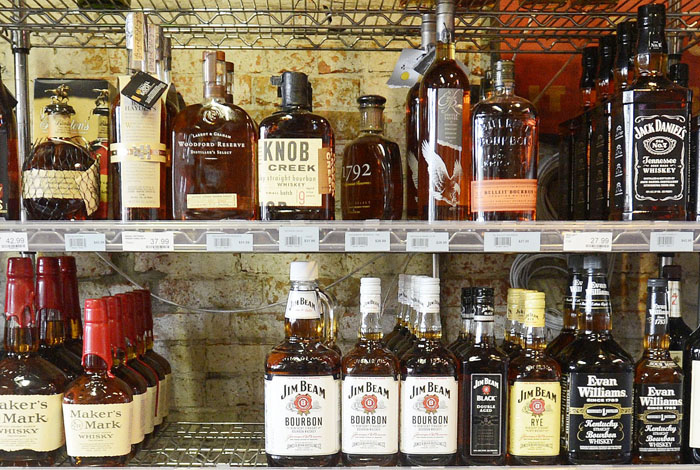AUGUSTA — A private business can run Maine’s wholesale liquor operation better than the state can, says Senate Majority Leader Seth Goodall, who introduced legislation Thursday to require the state to put its liquor business out for bids.
Goodall, a Democrat from Richmond, said the state did a poor job running the liquor business before it was contracted out to Maine Beverage Co. in 2004.
“When the state was doing the service, it was subpar and it was a big concern for agency liquor stores,” Goodall said. “Let’s make sure that we maintain that strong service from the private sector, but put it out to bid and make sure we get the best value for the state of Maine.”
Goodall’s bill contrasts sharply with a proposal by Republican Gov. Paul LePage for the state to control the proceeds from liquor sales, with “a private sector person to provide administration, trade marketing and distribution and warehousing activities.”
LePage’s proposed legislation calls for a contractor to monitor inventory, manage accounts, advertise and coordinate with suppliers.
Under Goodall’s bill, bidders for the 10-year contract would start by choosing one of two options: making an initial payment of $20 million, or $200 million.
From there, they would have to spell out:
• Their guaranteed annual payments to the state. The amount could change over each year of the contract.
• A revenue sharing formula. The state now gets 50 percent of the revenue over a certain amount.
• The minimum guaranteed profit margin needed by the bidder. The state sets liquor prices, so the figure would reflect the difference between suppliers and state-mandated prices. The figure is now 36.8 percent.
Goodall’s bill would require every bidder to put up a nonrefundable $25,000 fee and set guaranteed minimum discounts for agency liquor stores.
If no qualified bid were received, the current contract could be extended for one year for $34 million.
Goodall said his bill would not earmark contract revenue for a particular state program or bill because that discussion should be separate from getting the best terms possible for the state.
LePage has tied his proposal to paying down state debt to Maine’s hospitals.
Goodall said the money could be used for hospitals and education, but such decisions should be made by the Legislature’s Appropriations Committee, not mandated by a law.
In an email Thursday, LePage’s spokeswoman, Adrienne Bennett, said, “We believe the governor’s bill presents the best financial return on the state’s investment. …While all the details of Sen. Goodall’s bill have not been reviewed yet, it appears the Democrats goal is to continue to let a private company take all the upside from this business. The governor wants to ensure the state receives the best deal and make good on an old debt to our hospitals.”
Republican leaders criticized Goodall’s proposed legislation, particularly for not specifying how the revenue would be spent.
“History has shown that the Legislature under Democrats can’t help itself from using every last drop of revenue to fund government expansion,” said House Republican Leader Ken Fredette of Newport in a release. “We must do something responsible with this state asset and use it to pay our debts and put Mainers to work.”
The release accused Democrats in the Legislature of stalling on LePage’s proposal.
“They have been sitting on it for almost three weeks while Maine hospitals bleed money and lay off workers,” Fredette said.
The state’s 10-year contract with Maine Beverage Co. expires in 2014. In what has been described in hindsight as a bad deal for the state, the company paid $125 million up front for the contract, then split revenue with the state 50-50 over a set ceiling, which will add about $65 million over the course of the contract.
Maine Beverage Co. President D. Dean Williams said he is watching the latest debate with interest.
“The state needs to decide if it wants to take the business back or keep it in private hands,” Williams said. “We feel like there is a huge benefit to keeping it private.”
LePage recently rejected Maine Beverage Co.’s offer to pay a guaranteed $320 million to extend its contract without a bid process. LePage said he thinks the contract is worth more.
From mid-2004 through 2011, liquor sales totaled $864.7 million, according to financial documents filed with the state.
Williams said a lot goes into managing Maine’s liquor business.
“The problem with being a good operator is that people don’t think you do much. So for nine years this thing has just ticked and ticked and we’ve grown it, and now everyone thinks, ‘This is easy, let’s just take it back and get the profit,'” Williams said.
He said he likes Goodall’s proposal, particularly the big upfront $200 million payment.
When asked if his company would bid for any of the work under LePage’s scenario, Williams said: “As Maine Beverage Company? Probably not.”
Goodall said the governor should provide more detail on his plan.
“The state hasn’t proven they have the expertise,” he said. “The governor and his staff need to clearly outline what will be the total cost (of their proposal) and their exact plan on how they plan to administer the contract.”
LePage has said his plan would allow the state to collect more money from liquor sales and lower retail prices by $2 to $7 per bottle to make Maine more competitive with New Hampshire. The state also has said it wants to pay higher commissions to agency liquor stores.
Dirigo Spirit, a company founded last year to bid on the contract, could be leaner and more efficient than Maine Beverage Co., said its president, Ford Reiche of Auburn.
“State Finance Commissioner Sawin Millet and the State Liquor Bureau have been publicly working toward a fair and open selection process for more than a year without objections from any stakeholders except the incumbent, Maine Beverage Company,” Reiche said in an email Thursday. “This new legislative proposal is just another thinly veiled attempt to undermine that process. Maine taxpayers won’t be well served by repeating the 2004 political process that brought Maine Beverage Company to our state.”
Noel K. Gallagher can be contacted at 791-6387 or at:
ngallagher@pressherald.com
This story was corrected at 10:55 a.m. February 22, 2013 to correct an error in the subheadline, which had misidentified Senator Seth Goodall as a State Representative.
Send questions/comments to the editors.





Comments are no longer available on this story